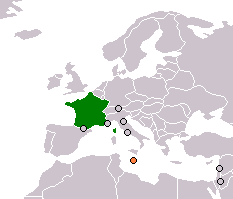French invasion of Malta
| French occupation of Malta | ||||||||||||
|
Occupation française de Malte (French) Occupazione francese di Malta (Italian) Okkupazzjoni Franċiża ta' Malta (Maltese) |
||||||||||||
| Military occupation | ||||||||||||
|
||||||||||||
|
Motto Liberté, Égalité Liberty, Equality |
||||||||||||
|
Map of Malta (orange) and France (green)
|
||||||||||||
| Capital | Valletta | |||||||||||
| Languages | French, Italian, Maltese | |||||||||||
| Religion | Roman Catholicism | |||||||||||
| Government | Military occupation | |||||||||||
| Military Governor | Claude-Henri Belgrand de Vaubois | |||||||||||
| Legislature | Commission of Government | |||||||||||
| Historical era | French Revolutionary Wars | |||||||||||
| • | French invasion | 9 June 1798 | ||||||||||
| • | Established | 11 June 1798 | ||||||||||
| • | Maltese rebellion | 2 September 1798 | ||||||||||
| • | Capitulation | 4 September 1800 | ||||||||||
| Currency | Maltese scudo | |||||||||||
|
||||||||||||
The French occupation of Malta lasted from 1798 to 1800. It was established when the Order of Saint John surrendered to Napoleon Bonaparte following the French landing in June 1798. In Malta, the French have established a constitutional tradition in Maltese history (as part of the French Republic), granted free education for all, abolished slavery and the feudal system, and established the freedom of press, such as with the publication of the Journal de Malte. The most aesthetic feature of the French occupation is probably the defacement of most coat-of-arms on the façades of buildings of the knights.
On 19 May 1798, a French fleet sailed from Toulon, escorting an expeditionary force of over 30,000 men under General Napoleon Bonaparte. The force was destined for Egypt, Bonaparte seeking to expand French influence in Asia and force Britain to make peace in the French Revolutionary Wars, which had begun in 1792. Sailing southeast, the convoy collected additional transports from Italian ports and at 05:30 on 9 June arrived off Valletta. At this time, Malta and its neighbouring islands were ruled by the Order of Saint John, an old and influential feudal order weakened by the loss of most of their revenue during the French Revolution. The Grandmaster Ferdinand von Hompesch zu Bolheim, refused Bonaparte's demand that his entire convoy be allowed to enter Valletta and take on supplies, insisting that Malta's neutrality meant that only two ships could enter at a time.
...
Wikipedia


